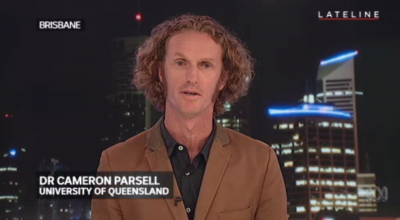Homelessness
Our homelessness research seeks to build knowledge about how people use social programs and resources to materially improve the conditions of their lives. The Institute has a strong working relationship with Government and service delivery providers through a suite of projects examining social housing, Indigenous housing and homelessness.
A key feature of our research approach for homelessness is its multi-methods approach; utilising qualitative methods to examine and understand experiences and personal histories, and quantitative methods to investigate general trends and make sense of large-scale complex processes and patterns.
Recognising that housing is a human right

ISSR Group Leader Dr Cameron Parsell joined the Victorian CEO of the Urban Development Institute of Australia, Danni Addison, and host Jeremy Fernandez on ABC's Lateline to discuss the concept of Housing First and finding permanent solutions to homelessness.
Read more in the ISSR article Watch the Lateline interview
ISSR research features on The Weekly with Charlie Pickering

While discussing the recent expulsion of people sleeping rough outside of Melbourne's iconic Flinders Street Station, the ABC's comedy news program The Weekly with Charlie Pickering cited findings from research led by ISSR's Dr Cameron Parsell that demonstrate providing people with supportive housing is cheaper than leaving them homeless.
Breaking the cycle of charity dependence
 Charity is foundational to Catholic values, and underpins assistance provided by organisations such as St Vincent de Paul Society Queensland (Vinnies Queensland). Yet evidence of what triggers charity requests, and the characteristics of charity services that make an actual difference, has been unclear to charity providers. ISSR researchers have now shed some light on this issue through research commissioned by Vinnies Queensland, providing insights on the cycle of charity seeking and giving through the organisation. This research has identified housing instability as a major driver of repeat charity requests, while the time spent by volunteers attending to people in need actually reduces further requests for charity.
Charity is foundational to Catholic values, and underpins assistance provided by organisations such as St Vincent de Paul Society Queensland (Vinnies Queensland). Yet evidence of what triggers charity requests, and the characteristics of charity services that make an actual difference, has been unclear to charity providers. ISSR researchers have now shed some light on this issue through research commissioned by Vinnies Queensland, providing insights on the cycle of charity seeking and giving through the organisation. This research has identified housing instability as a major driver of repeat charity requests, while the time spent by volunteers attending to people in need actually reduces further requests for charity.
Brisbane Common Ground
 The Institute for Social Science Research’s (ISSR) comprehensive evaluation of the Brisbane Common Ground project reveals that governments can save in excess of $13,000 per person each year, if they provide the chronically homeless with access to secure, long term housing and relevant support services.
The Institute for Social Science Research’s (ISSR) comprehensive evaluation of the Brisbane Common Ground project reveals that governments can save in excess of $13,000 per person each year, if they provide the chronically homeless with access to secure, long term housing and relevant support services.
The project showed that people who suffer from chronic homelessness often have complex needs relating to health, disabilities, abuse, and addiction, resulting in high costs associated with emergency medical and policing resources. Supporting homeless people through a combination of safe housing and targeted services, as provided by Brisbane Common Ground, resulted in a significant reduction in the amount of services required, delivering high cost savings to the community.
Aboriginal lifeworlds, conditionality, and housing outcomes
This study addresses the issues of obtaining an optimum balance between conditionality (especially tenancy rules and duties) and preserving Indigenous social capital, so as to enable an effective ‘recognition space’ between tenants’ life values and housing managers’ rule... Read more
Evaluation of the 'Street to Home' initiative
The Street to Home initiative seeks to target people experiencing chronic homelessness and rough sleeping and support them through a transition towards stable housing. This project proposes to evaluate the Street to Home initiative. The evaluation task requires an appraisal at the level of the... Read more
'Ending homelessness' strategies
The research is an examination of the role of models of supportive housing to end homelessness. It will specifically examine the practices, assumptions and effectiveness of diverse models of supportive housing in terms of ending homelessness and creating other non-housing outcomes.... Read more
Models of supporting housing evaluation
The proposed study will evaluate the effectiveness of models of supportive housing. Focusing on models with both onsite support in congregated forms and dispersed housing with support provided through outreach, it examines how different models operate, particularly the integration of support,... Read more
Review of systematic issues for clients with complex needs
This project examines the impact of the Queensland Government’s Anti-social behaviour management policy on social housing tenants with mental health and substance misuse issues. The project examines the relevant literature including policy and research evidence relating to sustaining... Read more
The impact of the place of living on social participation and wellbeing in older age
This study explores the links between place of living, social participation and wellbeing at older age using data from large-scale panel surveys covering Australia and other countries. Environmental conditions, such as housing and neighbourhood conditions, can impact on societal participation by older people.... Read more
Financial management services review
The Australian Government is leading a review of government-funded financial management support services in Australia, which aim to improve the financial self-reliance and wellbeing of individuals, families and communities. ISSR was engaged to develop an evaluation framework, and consult on the design of.... Read more
Exiting Homelessness and Sustaining Housing
Associate Professor Cameron Parsell was awarded a competitive Discovery Early Career Researcher Award (DECRA) to produce new theoretical and policy relevant knowledge about what people do to exit chronic homelessness and sustain housing. Generating knowledge and developing strategies to end homelessness and to.... Read more
Evaluation of the Mental Health Demonstration Project
The two-year Mental Health Demonstration Project commenced in July 2015 to test a new integrated housing, mental health and welfare initiative to assist people in social housing to sustain their tenancies whilst managing mental illness or related complex needs... Read more
